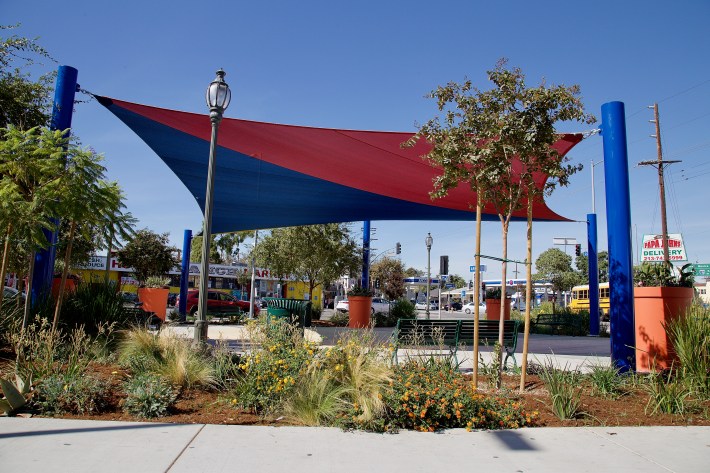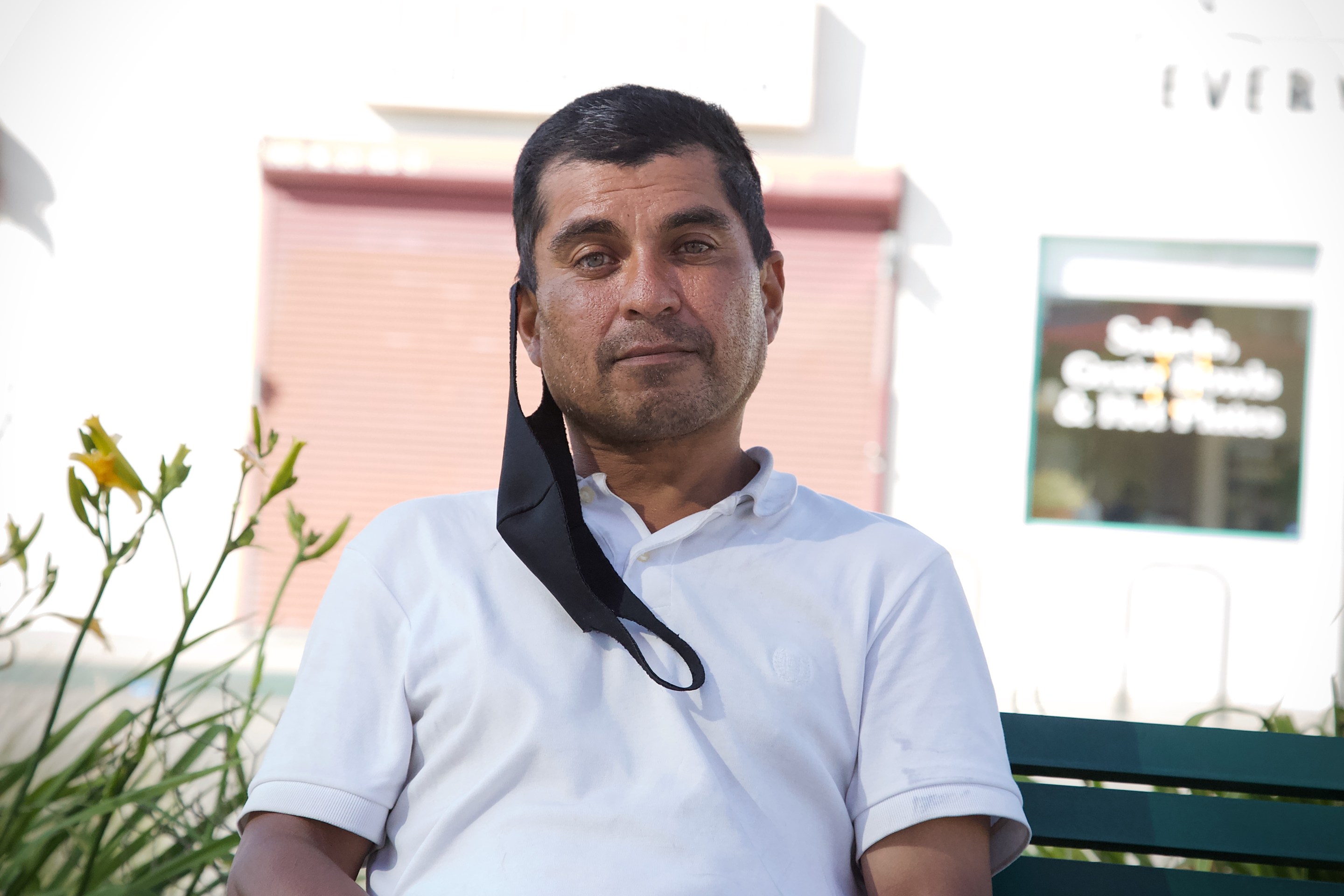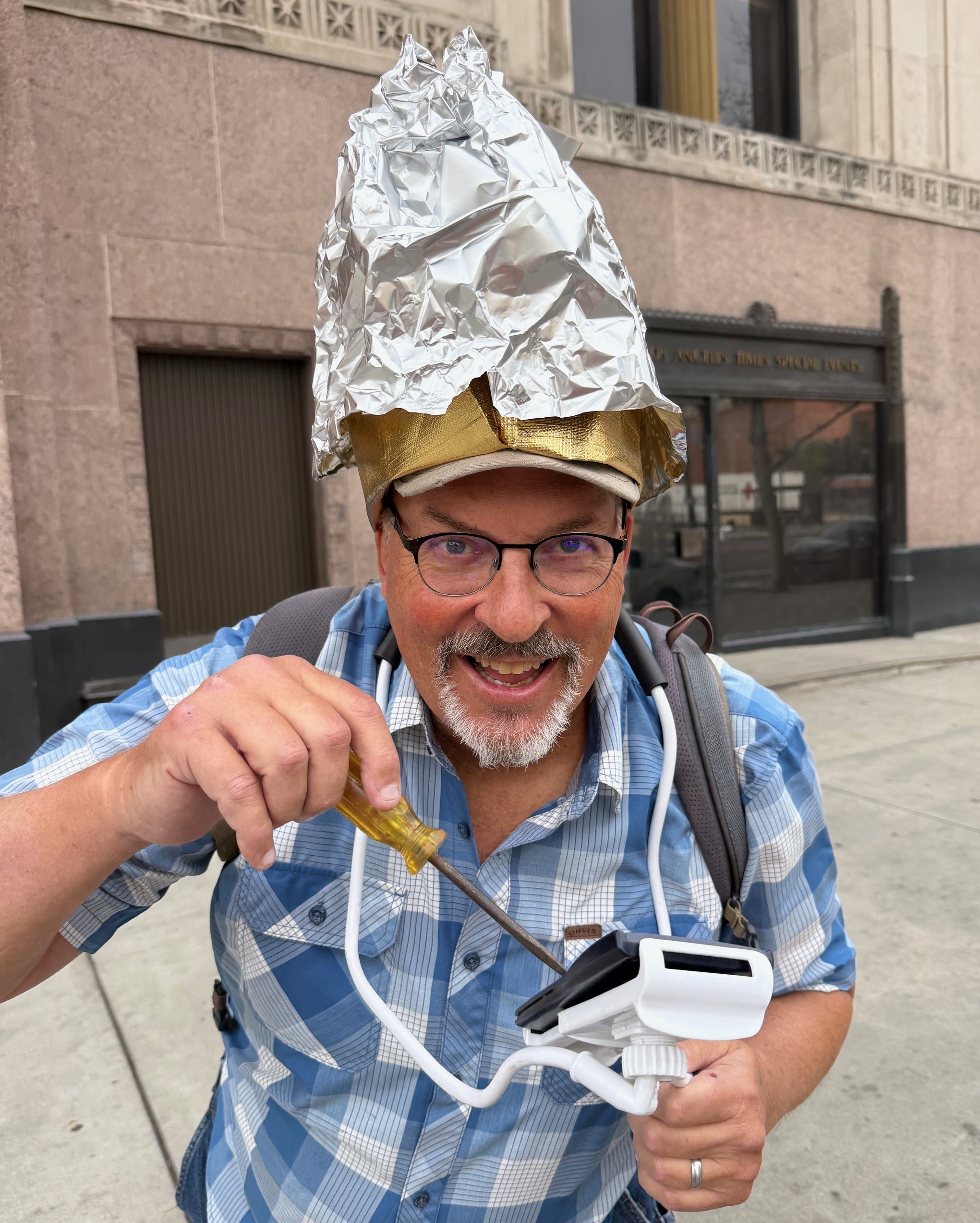The clacking of dominoes against the picnic table was a welcome sound of community on an otherwise largely empty street. The three masked men engaged in a friendly game initially didn't want to be photographed, but 47-year-old Miguel R. decided he had things he needed to get off his chest.
"You keep playing," he told his companions in Spanish. "I have some things I want to talk to this lady about."
As he stood up to walk me to a bench at the other end of the small plaza at Hoover and 23rd, he pointed to the forlorn pair of dentures resting in the sun on the adjacent table. It was evidence to him that people were falling apart, he said. Literally.
But he also seemed to see them as an omen - he was fearful he would fall apart soon, too.
"I have been homeless for 20 days," he said, looking a little shell shocked. "I can't explain what it's been like to sleep on the street for the last 20 days. I can't find myself."
He hadn't been doing great for the two years prior to becoming homeless, but he had at least been able to get himself to a place where he was finally stable.
"I worked on this street," he said, gesturing at Hoover. "I kept these streets clean."
Now he was struggling to find safe places to sleep and keep himself clean.
He was grateful for the gas station bathroom at 23rd, saying it was so humiliating to go to the bathroom in the street and to have people thinking that you wanted to treat your own community that way. But there were few other places he could go just to sit and be, and even fewer in the area that were offering help, so he tended to stay around the plaza.
And while he welcomed any help that was offered - like fresh meals from Everytable (paid for by customers that donated meals when purchasing their own) - he didn't want to have to rely on others forever.
He had earned just over $16,000 at a street sweeper job last year, he said, rustling through his backpack for his W-2 form, determined to attest to his status as a working man and a taxpayer. It was a transitional position obtained through a workforce program meant to help him get back on his feet, he said - he hadn't worked in 2018. But he had lost the job seven days before his year anniversary there when a random drug test came up positive for meth.
It was his own mistake, he acknowledged, though he said he was not much of a user. If anything, he was aware he drank a little more and a little more often than he should. But having lost that job, he wasn't able to transition to anything else. And with everything shut down during this emergency period, there wasn't anything to transition to anyways.
Not long after the checks had evaporated, so too had the money for the $580 room he'd been renting in the area. All he had left was his backpack and a blanket.

Had city council not balked yet again when it came to passing a full eviction moratorium - one that would have put a halt to all evictions this month and not just those where the tenant's ability to pay rent was demonstrably affected by the COVID-19 emergency - Miguel might still be housed.
It was impossible to say, of course. Landlords push tenants out in myriad ways, and it is difficult to enforce protections under the best of circumstances, especially when tenants are not aware of their rights or are too afraid to try to exercise them.
But one of the reasons Eleventh District councilmember Mike Bonin had waged a month-long battle to sway the landlord-heavy council in favor of a full moratorium was to keep as many people in Miguel’s type of situation as possible from ending up on the street. Allowing more folks on the margins to join the ranks of the unhoused at the very moment the city is struggling to contain the spread of the disease by rapidly moving people into shelter makes no sense and puts all Angelenos at risk.
At the very least, getting Miguel back on his feet once the emergency passes will require a much more intensive deployment of resources than keeping him housed would have - something Miguel himself has grown increasingly concerned about as he monitors his own mental health status and wonders how and when he'll ever get out of the hole he has found himself in.
"I've been here [in this community] since 1981; I've lost friends on this street," Miguel said, turning towards Hoover again and shaking his head. "What's going to happen to me?"
The shame of feeling people would see him differently without his uniform and without something productive to do had crushed him. More crushing still was the fear they wouldn't see him at all.
As of now, he is still seen.
Mark, an older resident of the area who was once an addict himself but is now nine years sober, interrupted his walk to offer an unsolicited endorsement of Miguel's character and to say he was proud of how far Miguel had come. The two men Miguel had been playing dominoes with earlier had let him join in because they knew him from his street sweeping days. And the elderly couple that stopped to chat after buying bread at a nearby market passed no judgment and only seemed happy for the opportunity to make conversation.
Everybody was struggling now, the couple said, themselves included.
The husband, who relied on a walker, had undergone a kidney transplant 9 months earlier and had largely been confined to his apartment since then. His wife pointed to her cane and spoke of the pain and weakness in her leg. And now this coronavirus has come and threatened their fragile health, lamented the husband in Spanish from behind his mask before shuffling off, may God keep us all safe.
_______
"If I could just get that stimulus, I could at least buy a car that I could sleep in," Miguel mused, turning his now-empty payroll debit card over and over in his hands like a talisman.
Friends had told him the stimulus checks from the federal government had been sent directly to their payroll cards, so he had hung onto his and checked the balance whenever he could, hoping the money would magically materialize. "But you have to have filed your taxes - that's what they said on the radio," he said. "And [the tax preparers across the street] want to charge me $80 to file my taxes, so I can't get it."
He had his W-2 with him and all his relevant information, he said, pulling out the plastic bag with all his documents again. But without a phone or internet access and all the libraries being shut down, he didn't know how to go about filing on his own.
Although a friend that came by the plaza every few days would let Miguel borrow his phone for a few minutes to make a call if he needed to, it wasn't the same as having the ability to try to track down the resources available to someone in his situation* or take care of financial business. [*Readers may recall the story of the day I spent seven hours on the phone trying to track down resources to prevent a young friend from becoming homeless, only to fail and end up putting him up in a motel.]
And easy as it turned out that Miguel's taxes were to do on my phone, it still took us nearly an hour. Little things that should not have been complicated proved a challenge, like verifying his email address (he had carefully penned a purposely difficult-to-decipher password in a notebook that was now damp from all the spring rain L.A. has had) or deciding where to send the check (he didn't have a bank account or home address, and we didn't know how to get the tax return sent to his payroll debit card).
As we worked, he spoke about how he had not always been in such dire straits.
Just over decade ago, he had won a settlement from the Los Angeles Archdiocese. The abuse had begun when he was eight, he said, and gone on for several years. The settlement had allowed him and his then-wife to buy a home in Santa Clarita, and he'd had access to some therapy during the five years that the legal process was underway. But he'd never had money before and didn't know how to manage it. And the demons he was wrestling with had never truly been subdued. So it eventually all fell apart.
"But it was a nice five years we had," he said wistfully.
Then he looked down at the can of beer in his hand before admitting that since he's been on the streets, he's been tempted to drink himself into oblivion.
It's much worse at night, he said, when all the people that have been on the move or hiding out during the day are seeking somewhere safe to sleep. He sees so many now.
"You can see that they're desperate," he said. "Hell, I'm desperate." So much so that he was considering going back to Nicaragua, the country his family had fled in the 1980s.
The news that, between his tax returns and the stimulus, he should be getting around $2,100 was the first ray of hope he said he'd had in three weeks. But could he hold it together long enough for the checks to arrive, given that the paper stimulus payments are being delayed by weeks or even months? He didn't seem sure.
"I understand why people lose their minds out here," he said of feeling himself growing a little more alienated from society and a little more out of touch every day. Watching himself deteriorate in real time frightened him.
"Am I going to make it?" he asked. "Or am I going to go insane?"







